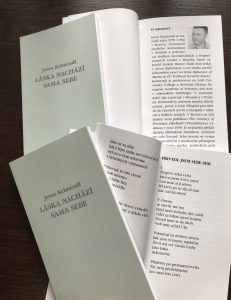
Number of visitors on page:
Page Visitors:

Love finds itself everywhere of Jeton Kelmendi is translated and published in Chech by By Klára Hůrková
Introduction
By Klára Hůrková, Aachen, Germany
The collection Love finds itself everywhere contains texts from 2015-2022 and is the poet’s personal confession. It tells us about his life journey in multi-layered images, but not chronologically. Its milestones are not specific experiences or stories, but rather ideas and ideals. Nevertheless, these are deeply introspective verses, in which the lyrical Self often conducts a conversation with itself, sometimes the lyrical subject is even doubled, appearing as “I” and “you”.
The central theme and recurring motif is time. And this is both the time actually experienced by an individual human, and also as a phenomenon in the poet’s imagination. The very first poem deals with the theme of time travel, the feeling and the idea that our life cannot be limited to the present, which seems very imperfect. The lyrical subject yearns to know wider dimensions, however, does not find “the door to another time/where I could love a little better/and stay a little longer.” The motive of the desire to know who a person could be in another time, whether in the past or in the future, appears, for example, in the poem I feel that I once was: “It seems to me that I was once/ Once in the Middle Ages in ancient times/perhaps yesterday/ or I read it somewhere in esoteric books/ Perhaps I heard the voices of ancient times/ which sometimes appear to me/ and haunt me/between being and absence//(…) I live in the present I live today/ and yet I am not here//In to our limitless world/ time seems too tight’.
Nevertheless, most of the poems relate to the time of a concretely experienced human life, present time. Even in them, however, Kelmendi appeals to a reader to break out of a too tight present, to include the past in his decisions and to live in the future at the same time. “Live now before today/ so that tomorrow you can look yourself in the eye”, says the poem My Message, which is subtitled Testament for Noida and dedicated to the poet’s son. In other poems, the theme is oblivion, erasure from the memory of time, which tends to be the lot of writers and all artists in authoritarian regimes: “Today’s time has no time/ Nor for my songs/ Nor for its own rituals (…) Whenever love rises to the top of possibilities/ the sense forgets the author/ Authors are then designated/ as interpreters of freedom” (My country has a bad habit). Or: “You deliberately ignore me / life in my homeland / while I live in freedom / oblivion surrounds me (Life in oblivion).
Again, in other texts, Kelmendi describes feeling as if he finds himself “out of time”, in the sense that time is strange and one does not fit into it: “In what time do we live/ what nightmares/ while we lag behind ourselves” (We Live out of time these days). Most of these poems have a political subtext, which is evident from the explicit addressing of the poet’s homeland. The experience of the war in Kosovo, in which Jeton Kelmendi participated as a soldier, is present in most of his texts, although it is rarely mentioned directly. A man on whose shoulders are placed great tasks and who feels the weight of responsibility, fights with fear and doubts, but still sets out on the journey, is the main character of many poems in this collection. In others, the lyrical subject expresses his disappointment with developments in his country and the ever-resurfacing hopes and disappointments.
Time also plays one of the main roles in the poems related to the global experience of the covid pandemic. Thus, in the poem Friendship in the Time of a Pandemic, time acts like a living being: “Time is sitting there in its own bed/ How to wake it up/ Or even time is frightened of/ the Covid pandemic?” A similar personification of abstract concepts is one of the main features of Kelmendi’s poetry: Time, courage, love, hope, freedom, fear and the like are frequent inhabitants of his texts. However, they do not appear in hackneyed phrases or vague statements, as is often the case when a poet abandons concrete images and reaches for abstracts. In Kelmendi’s texts, these concepts act as living beings or objects that actively experience different stories: “Tonight courage swallowed my silence (Origin of courage)”; “And time, an island inhabited by the timeless/ gives time to those who are without time (I have something to tell you); “I’m asking for patience for strength/ so that freedom can change the plan” (You’ve Only Got Ninety Minutes of Freedom in This Country); “Maybe / love can send me / a new invitation to wake up” (Trace of Life).

The wording of some verses sounds mysterious, vague in places, so that it is not possible to penetrate them completely with reason. However, this seeming indeterminacy creates its own atmosphere, that gives the poems a message. It is necessary to read between the lines and perceive the hidden pains and mental struggles expressed only in hints. Another typical feature is the fondness for paradoxical expressions: “Truth broke dreams/ until meaning lost its meaning”, “The time of false truth/ and silent words” (I sat at the beginning of myself); “We eat and drink the past of this day” (Knock at the entrance of the exits); “I’m from there/ where I’ve never been (Everything Goes Far). This stylistic feature may be related to the theme of unsolvable political and life situations.
In addition to the introspection of the poet’s life against the background of the events in which he was a direct participant, love in various forms is also a prominent theme of the poems: fulfilled and unfulfilled, present and past, real and dreamlike. Sometimes concrete images emerge: the sun over the mountain peaks of Lake Como, a secret meeting with a lover during a pandemic (“love illegal for a virus”), a memory of the countryside around Rugova.
Isolation in the time of covid in particular awakens longing and creates powerful poetic images: “One day/ when your face goes crazy/ with my absence/ I’ll write a time of decision/ in another time in our love” (The Day I’m Bored). Most of the poems in the collection are marked with a specific date and place of writing. Nevertheless, the texts are not arranged chronologically, since time sequence does not play a role in them. Jeton Kelmendi gives us an insight into his poetic vision in timelessness, in layers in which themes overlap, return and deepen. The collection, which is published for the first time in the Czech language, is a representative sample of the contemporary poetic work of this distinctive European author.